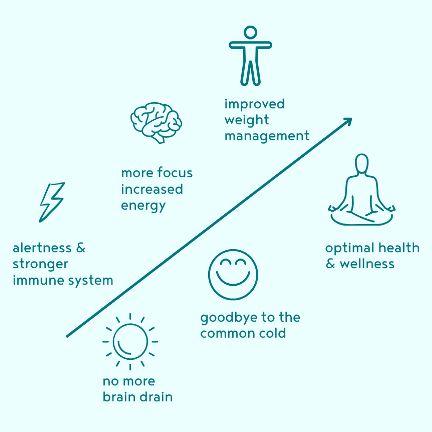Why Vitamin A is Crucial for Your Health: Benefits and Sources

Vitamin A is a crucial nutrient that plays an essential role in maintaining overall health. It is a fat-soluble vitamin that is naturally present in many foods, including liver, eggs, and dairy products. Vitamin A is also available in the form of supplements and fortified foods.
This nutrient is essential for maintaining healthy vision, ensuring the normal functioning of organs and the immune system, and establishing healthy skin and mucous membranes. Vitamin A also has antioxidant properties, which means it can protect your cells against the effects of free radicals.
Despite its importance, many people do not consume enough vitamin A in their diets, which can lead to deficiency and a range of health problems. In this article, we will explore why vitamin A is crucial for your health and how you can ensure you are getting enough of this essential nutrient. We will also discuss the benefits and risks of vitamin A supplements.
What is Vitamin A?
Vitamin A is a fat-soluble vitamin that is essential for the normal functioning of the body. It is vital for maintaining healthy vision, ensuring the normal functioning of organs and the immune system, as well as establishing and maintaining healthy skin and mucous membranes.
There are two main types of vitamin A: preformed vitamin A and provitamin A. Preformed vitamin A is found in animal products such as liver, fish, and dairy products. Provitamin A is found in plant-based foods such as fruits and vegetables, and is converted into vitamin A in the body.
Retinol is the most active form of vitamin A and is found in animal products. It is important for maintaining healthy vision, especially in low light conditions. Retinol is also essential for the normal functioning of the immune system and for maintaining healthy skin and mucous membranes.
Beta-carotene and other carotenoids are provitamin A compounds found in fruits and vegetables. They are converted into vitamin A in the body and are important for maintaining healthy skin and mucous membranes, as well as for supporting the immune system.
Animal products are the richest sources of preformed vitamin A, while fruits and vegetables are the richest sources of provitamin A. Some examples of foods high in vitamin A include:
- Liver
- Fish
- Dairy products
- Carrots
- Sweet potatoes
- Spinach
- Mangoes
- Papayas
It is important to note that while vitamin A is essential for good health, excessive intake can be harmful. High levels of vitamin A can cause toxicity, which can lead to a range of symptoms including nausea, vomiting, and even liver damage. Therefore, it is important to consume vitamin A in moderation and to consult a healthcare professional before taking vitamin A supplements.
Why Vitamin A is Crucial for Your Health
Vitamin A is an essential nutrient that plays a crucial role in maintaining good health. It is important for the immune system, growth and development, vision, reproduction, and the health of skin and mucous membranes. This section will explore the benefits of vitamin A, sources of vitamin A, vitamin A deficiency, and precautions and warnings related to vitamin A intake.
Benefits of Vitamin A
Vitamin A has many important functions in the body. It is essential for maintaining healthy vision, especially in low light conditions. It also supports the normal functioning of the immune system, helping to fight off infections and diseases. Vitamin A is important for the growth and development of cells, including white blood cells, which are crucial for fighting infections.
In addition to these benefits, vitamin A is also important for the health of skin and mucous membranes. It helps to keep these tissues moist and healthy, protecting against infections and damage. Vitamin A also plays a role in the health of the heart and lungs, helping to maintain normal functioning of these organs.
Sources of Vitamin A
There are two main types of vitamin A: retinoids and carotenoids. Retinoids are found in animal products, such as liver, fish, and dairy products. Carotenoids are found in plant foods, such as carrots, sweet potatoes, and leafy greens. The body can convert some carotenoids into vitamin A.
It is important to note that excessive intake of vitamin A from supplements or animal sources can be toxic and lead to liver damage, lung damage, and other health problems. It is best to get vitamin A from a balanced diet rather than supplements.
Vitamin A Deficiency
Vitamin A deficiency is a common problem in many parts of the world, particularly in developing countries. It can lead to a range of health problems, including night blindness, corneal ulcers, and an increased risk of infection. In pregnant women, vitamin A deficiency can increase the risk of birth defects and infant mortality.
Conclusion
In conclusion, vitamin A is an essential nutrient that plays a crucial role in maintaining good health. It is important to get vitamin A from a balanced diet rather than supplements, and to be cautious about excessive intake. By including vitamin A-rich foods in your diet, you can help to ensure that you are getting the nutrients you need to stay healthy.
Vitamin A is essential for treating certain conditions such as acne, dry eyes, and anemia. It is also a vital nutrient for maintaining healthy eyesight, immune function, and reproductive health. Pregnant and breastfeeding women, as well as infants, require adequate amounts of Vitamin A to support fetal development and growth.
Taking a multivitamin supplement that contains Vitamin A can be an easy and convenient way to ensure that you are meeting your daily requirements. However, it is important to choose a reputable brand and follow the recommended dosage.
Overall, Vitamin A is a crucial nutrient that should not be overlooked. By including Vitamin A-rich foods in your diet and following the RDI, you can reap the many benefits of this essential nutrient while avoiding potential harm.






